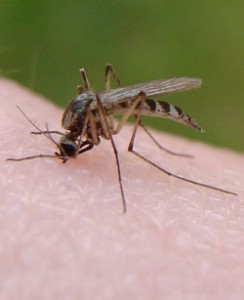There are several ways to avoid mosquito bites - for example, by
- hide their body odor from mosquitoes
- deter mosquitoes
- cover the skin
- Avoid places where mosquitoes thrive
In this article, we review the methods above and explain how best to avoid mosquito bites.

7 tips to avoid mosquito bites
Below we review the best tips for avoiding mosquito bites. The tips are in order of priority, so the most effective and important tips come first and the less important ones last:
1. Mosquito repellent
The absolute best protection against mosquitoes is mosquito repellent. There are two types: synthetic and natural mosquito repellents. Synthetic mosquito repellents are more effective and have a longer duration of action than natural ones and are therefore often preferred.
The two types of mosquito repellents also work differently on mosquitoes; the synthetic ones repel mosquitoes where the natural ones drown out our natural body odors, camouflaging us from the mosquitoes. Read more about choosing mosquito repellent here.
2. Mosquito control
In addition to protecting your body with mosquito repellents, you can also actively fight mosquitoes in your local area using e.g. mosquito traps, mosquito killers, mosquito light and mosquito coils. If you fight mosquitoes, use mosquito repellent and follow the advice below, you will be optimally protected.
3. Clothing
Covering your body is one of the most effective ways to avoid mosquito bites. Although mosquitoes can bite through tight-fitting clothing and thin textiles, clothing significantly reduces the risk of mosquito bites. In other words, it's the uncovered areas of the skin that are most at risk (and especially the areas where the body gives off the most heat, such as the wrists, ankles and neck).
There are different theories about whether clothing colors affect mosquito bites. One theory is that dark clothing attracts mosquitoes because it absorbs more heat than light clothing (and it's a fact that mosquitoes are attracted to heat). Another is that mosquitoes supposedly prefer clothing colors that stand out from their surroundings. Some also believe that light clothing colors are more attractive to mosquitoes than dark colors. However, none of these theories have been scientifically proven.
4. Wind
Mosquitoes are neither fast nor particularly stable fliers. Wind makes it even more difficult for them to fly and they avoid windy areas. Therefore, staying in a ventilated area reduces the risk of mosquito bites.
5. Time of day
Mosquitoes bite most in the evening - especially in the hours around dusk. In warm countries, mosquitoes can also be very active in the morning hours at sunrise. Avoiding the outdoors during these hours (and remembering to use mosquito repellent) will significantly reduce the risk of mosquito bites.
6. Locations
If you're heading out into nature, it can be difficult to avoid mosquitoes altogether - but by avoiding the places where mosquitoes thrive, you can significantly reduce the risk of mosquito bites.
Mosquitoes are most commonly found in places where there is no wind, shade and humidity. They often live near stagnant water because this is where their larvae develop. Examples include forest lakes, water troughs, ditches, pools and the like.
7. Mosquito nets
Mosquito nets are mostly used in countries where mosquitoes are a major problem. In Denmark, it is most relevant in the summer, when the mosquito problem is at its worst. However, if you'll be sleeping outdoors in a tent or bivouac (or directly under the night sky), it's always a good idea to bring a mosquito net. This also applies to old cabins and the like, where mosquitoes can easily get inside. Here you can place the mosquito net over the bed or in front of the window.
Mosquito bites at night
Mosquito bites at night can be a big problem because when you're asleep, you're less aware of your body and therefore more susceptible to bites.
However, if you suddenly get mosquito bites at night in your own home, you should consider whether they are actually mosquito bites. In many cases, the bites are not bites at all, but rather bites from bedbugs or fleas.
If you do have mosquito bites, it's a good idea to follow the last tip on the list above - using a mosquito net - because it's one of the most effective ways to avoid mosquito bites at night. In practice, you can hang the mosquito net over the bed or in front of the window (or other openings).
If you are sleeping in a very mosquito-infested area, you may want to consider buying a mosquito net that is impregnated with mosquito repellent. However, this is rarely necessary in Denmark.
You can also spray mosquito repellent on windows, doors and walls before going to sleep. Just remember to leave the room for an hour after spraying.
Mosquito bites in winter
In Denmark, mosquito bites in winter are usually caused by the large house mosquito (Culiseta annulata). The mosquito stings especially if you disturb it at its hibernation site.
However, since most mosquito species are not active in winter, you should consider whether the bites are actually flea bites or bedbug bites.
